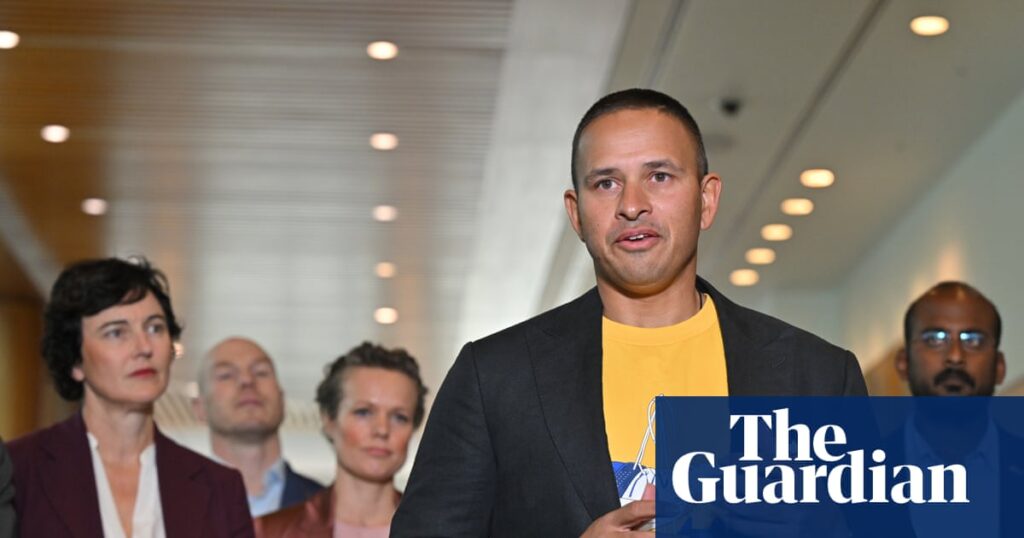Australian cricketer Usman Khawaja says the Albanese government has been “100% too slow” to ban gambling ads and must sever the link between the wagering and sport to protect children.
Khawaja made a public plea for change alongside a group of crossbench MPs, public health academics, doctors and other experts at Parliament House.
“The relationship that young kids are having with gambling is scary and it’s dangerous,” Khawaja said. “We are normalising gambling for the younger generation.
“I can’t watch an NRL game without getting odds right before a game. I play grade cricket with young cricketers who are coming through. There are 16-year-olds with gambling accounts and they cannot watch the game without putting a bet on.”
Sign up: AU Breaking News email
The Albanese government is yet to formally respond to a bipartisan parliamentary report led by the late Labor MP Peta Murphy, which called for a comprehensive ban on gambling ads after a three-year transition period.
The government had planned to introduce legislation before the federal election in May but reforms were shelved amid fierce opposition from broadcasters, sporting codes and some bookmakers.
The communications minister, Annika Wells, has restarted negotiations with industry and several gambling sources have told Guardian Australia they expect to see legislation by the end of the year.
When asked what the government’s first step should be, Khawaja said it should “ban gambling from sport – it’s quite simple”.
“You have to go cold turkey, it’s the same as what happened with tobacco,” Khawaja said. “We have a responsibility.
“If gambling is repeatedly being brought together with sport and athletes, showing you can’t watch sport without gambling, then it is a very, very dangerous precedent to set.”
Khawaja met with Albanese and the treasurer, Jim Chalmers, on Thursday, after the cricketer said he had earlier been told that a scheduled meeting with the prime minister had been cancelled. Chalmers later said he and Albanese had met Khawaja but that the conversation focused “solely” on the Middle East.
Khawaja had earlier fronted another press conference – alongside David Pocock, Labor MP Ed Husic, and other independent MPs including Helen Haines and Kate Chaney – calling for the government to level further sanctions on Israel, and cut trade ties, over Palestinian civilian deaths from the war in Gaza.
Chalmers described Khawaja as a friend and a “wonderful humanitarian”.
“We have a lot of respect [for Khawaja] and we listened to him on the issues … he’s a leader of real substance, not just the leader in the faith community, but a leader more broadly,” Chalmers said.
“I take his contribution very seriously. I’m grateful … that he’s made the time to come and talk with us directly about these issues.”
The prime minister and communication minister’s offices were contacted for comment.
Earlier this week, when asked why it had taken more than two years to respond to the inquiry, Albanese told parliament the government was mindful “of whether people just go offshore” to continue gambling. Offshore gambling service are banned in Australia and not subject to consumer protections.
Samantha Thomas, a professor of public health at Deakin University who specialises in gambling research, said she was concerned the government appeared to be using “industry talking points”.
Many bookmakers have long argued restricting gambling in Australia would push consumers to offshore competitors, which are not subject to consumer protections.
“Despite industry rhetoric, there is limited independent evidence to suggest that ad bans would lead to a mass exodus to illegal markets,” Thomas said.
“Independent analysis also shows that we don’t need gambling ads to protect free-to-air television and big media brands. If we are to move forward in Australia, we must also disrupt industry influence over policy.”
Dr Kerrie Aust from the Australian Medical Association was among the group calling for change. She said that, as a GP, she “had seen the damage gambling is causing and its links with mental health disorders and substance abuse”.
“It’s disappointing that steps have not been taken to address the really good evidence in this [parliamentary] report and the really good recommendations that came from it,” Aust said.
“We wants kids and young people playing sport and having their heroes without a constant stream of gambling advertising.”
Independent MP Kate Chaney, who was a member of the Murphy inquiry, accused the federal government of “listening to the money from gambling, sport and the media instead of listening to the voices of the community”.


